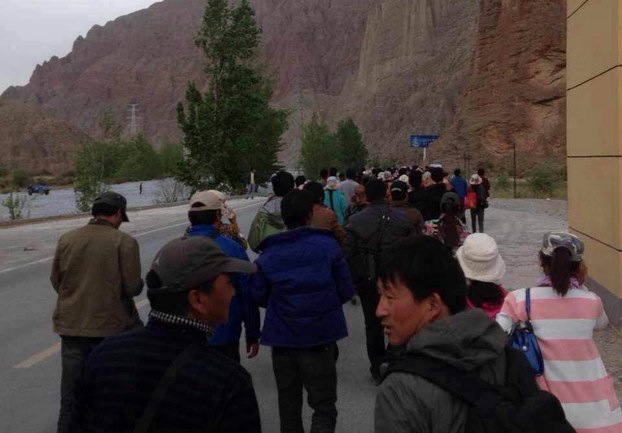




Over 100 Tibetan teachers launched a march this week to Qinghai provincial headquarters to back demands for better pay and benefits after an earlier protest was ignored by local authorities, sources said.
The teachers, who had been hired as “contract” workers, stopped their march on Wednesday to the provincial capital Xining after being told that their concerns would be addressed, the sources said.
The march followed an April 30 sit-down protest outside Malho (in Chinese, Huangnan) prefecture offices by 160 teachers coming mainly from Rebgong (Tongren) county and surrounding rural areas.
Participants in last week’s protest had called on authorities at the county and prefecture levels to provide “fair compensation for their work,” but their demands were ignored, a local source told RFA’s Tibetan Service on Wednesday.
“So they decided to march to Xining to present their case to provincial authorities,” he said.
After reaching a motor vehicle training center at Gurong Khok in Rebgong, the marchers were stopped by a county official and the principals of area schools, who promised them their grievances would be “addressed,” the source said.
“After being given this assurance of help, the protesters ended their march to Xining,” he said.
'Treated like servants'
Teachers working in Rebgong have increasingly been hired in recent years as contractors, or “substitutes,” and are denied the pay and benefits given to full-time teachers though they also perform full-time work, according to local sources.
“Substitute teachers in Rebgong are paid the minimum wage of 500 to 1,000 yuan [U.S. $80 to $160] per month without any other benefits, and this has been going on for over ten years,” one source said.
“The substitute teachers have continued their work in the hope they will be ‘regularized’ to full-time status, but the authorities have ignored their requests and demands, and many teachers in some schools have been treated more like servants,” he said.
Sources say the teachers’ protest underscores a growing problem in Tibetan areas of China, where Han Chinese are frequently hired ahead of Tibetans and where facility in the Chinese language is often a requirement for promotion.
Teachers have also been among the many Tibetans jailed for asserting Tibetan national and cultural identity since widespread protests swept Tibet and Tibetan-populated provinces in Sichuan, Qinghai, and Gansu in 2008.
Others jailed have included writers, artists, and singers.
Reported by Lumbum Tashi and Yangdon Demo for RFA’s Tibetan Service. Translated by Karma Dorjee. Written in English by Richard Finney.